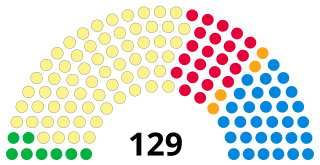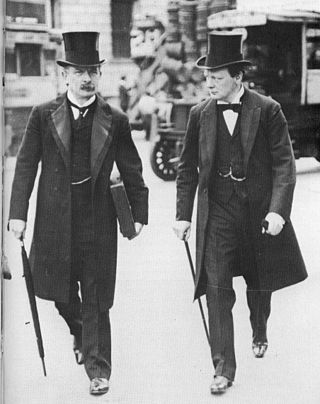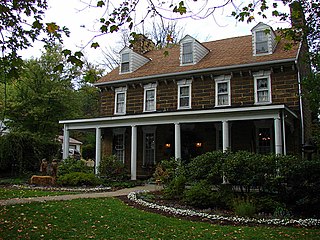
The House of Commons is the lower house of the Parliament of the United Kingdom. Like the upper house, the House of Lords, it meets in the Palace of Westminster in London, England. The House of Commons is an elected body consisting of 650 members known as members of Parliament (MPs). MPs are elected to represent constituencies by the first-past-the-post system and hold their seats until Parliament is dissolved.

A pub is a drinking establishment licensed to serve alcoholic drinks for consumption on the premises. The term first appeared in the late 17th century, and was used to differentiate private houses from those which were open to the public as alehouses, taverns and inns. Today, there is no strict definition, but CAMRA states a pub has four characteristics:
- is open to the public without membership or residency
- serves draught beer or cider without requiring food be consumed
- has at least one indoor area not laid out for meals
- allows drinks to be bought at a bar

The Scottish Parliament is the devolved, unicameral legislature of Scotland. Located in the Holyrood area of the capital city, Edinburgh, it is frequently referred to by the metonym Holyrood. The Parliament is a democratically elected body comprising 129 members known as Members of the Scottish Parliament (MSPs), elected for five-year terms under the additional member system: 73 MSPs represent individual geographical constituencies elected by the plurality (first-past-the-post) system, while a further 56 are returned as list members from eight additional member regions. Each region elects seven party-list MSPs. Each region elects 15 to 17 MSPs in total. The most recent general election to the Parliament was held on 6 May 2021, with the Scottish National Party winning a plurality.

The Parliament Acts 1911 and 1949 are two Acts of the Parliament of the United Kingdom, which form part of the constitution of the United Kingdom. Section 2(2) of the Parliament Act 1949 provides that the two Acts are to be construed as one.

A tavern is a type of business where people gather to drink alcoholic beverages and be served food such as different types of roast meats and cheese, and where travelers would receive lodging. An inn is a tavern that has a license to put up guests as lodgers. The word derives from the Latin taberna whose original meaning was a shed, workshop, stall, or pub.

The Royal Courts of Justice, commonly called the Law Courts, is a court building in Westminster which houses the High Court and Court of Appeal of England and Wales. The High Court also sits on circuit and in other major cities. Designed by George Edmund Street, who died before it was completed, it is a large grey stone edifice in the Victorian Gothic Revival style built in the 1870s and opened by Queen Victoria in 1882. It is one of the largest courts in Europe. It is a Grade I listed building.

Taxation in the United Kingdom may involve payments to at least three different levels of government: central government, devolved governments and local government. Central government revenues come primarily from income tax, National Insurance contributions, value added tax, corporation tax and fuel duty. Local government revenues come primarily from grants from central government funds, business rates in England, Council Tax and increasingly from fees and charges such as those for on-street parking. In the fiscal year 2014–15, total government revenue was forecast to be £648 billion, or 37.7 per cent of GDP, with net taxes and National Insurance contributions standing at £606 billion.
A stamp act is any legislation that requires a tax to be paid on the transfer of certain documents. Those who pay the tax receive an official stamp on their documents, making them legal documents. A variety of products have been covered by stamp acts including playing cards, dice, patent medicines, cheques, mortgages, contracts, marriage licenses and newspapers. The items may have to be physically stamped at approved government offices following payment of the duty, although methods involving annual payment of a fixed sum or purchase of adhesive stamps are more practical and common.

The 1909/1910 People's Budget was a proposal of the Liberal government that introduced unprecedented taxes on the lands and incomes of Britain's wealthy to fund new social welfare programmes. It passed the House of Commons in 1909 but was blocked by the House of Lords for a year and became law in April 1910.

During British Summer Time (BST), civil time in the United Kingdom is advanced one hour forward of Greenwich Mean Time (GMT), in effect changing the time zone from UTC±00:00 to UTC+01:00, so that mornings have one hour less daylight, and evenings one hour more.

Big Ben is the nickname for the Great Bell of the Great Clock of Westminster, at the north end of the Palace of Westminster in London, England, and the name is frequently extended to refer also to the clock and the clock tower. The official name of the tower in which Big Ben is located was originally the Clock Tower, but it was renamed Elizabeth Tower in 2012 to mark the Diamond Jubilee of Elizabeth II.

Evercreech is a village and civil parish 3 miles (4.8 km) southeast of Shepton Mallet, and 5 miles (8.0 km) northeast of Castle Cary, in the Mendip district of Somerset, England. The parish includes the hamlet of Stoney Stratton and the village of Chesterblade.

Shambles Square is a square in Manchester, England, created in 1999 around the rebuilt Old Wellington Inn and Sinclair's Oyster Bar next to The Mitre Hotel.

Walsoken is a settlement and civil parish in Norfolk, England, which is conjoined as a suburb at the northeast of the town of Wisbech, Isle of Ely, Cambridgeshire.

St Mary's Church in Handsworth, South Yorkshire, is a Church of England parish church about 3+1⁄2 miles (5.6 km) east of the centre of Sheffield, England.

Hill's Tavern is a historic building in Scenery Hill, Pennsylvania. It was heavily damaged by a fire that started shortly before midnight on August 17, 2015. For a period in the early 1900s, the inn was known as Central Hotel. Now called the Century Inn, it has been claimed to have been the oldest tavern in continuous use on the National Road, until the fire brought an end to its 221 years of continuous operation.

This is an index of drinking establishment-related articles.

The 2019 United Kingdom general election was held on Thursday 12 December 2019 to elect members of the House of Commons. The Conservative Party won a landslide victory with a majority of 80 seats, a net gain of 48, on 43.6% of the popular vote, the highest percentage for any party since the 1979 United Kingdom general election.

Stratton's Inn is a historic house on East Street in Brookfield, Vermont. Built in the late 1790s as a tavern located at the junction of two locally important roads, it is a fine example of Federal period architecture, most importantly preserving the inn's original tap room. It was listed on the National Register of Historic Places in 1982.


















